

The Four Kinds of Social Capital that Matter When Building Products. Though the term k-factor, a measure of the virality of an application, has waned in popularity since Facebook’s sheep-throwing glory days, the idea of spreading a product through referrals lives on.
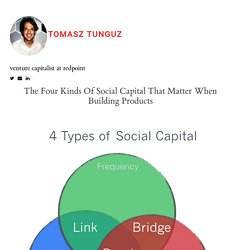
We all know a good referral mechanism when we see one. Dropbox’s invite-a-friend feature which awards free storage for both the inviter and the invited is the canonical example and resulted in torrid growth for the company. In April 2010, Dropbox users sent 2.8M referral emails. Neoliberalism is creating loneliness. That’s what’s wrenching society apart. What greater indictment of a system could there be than an epidemic of mental illness?
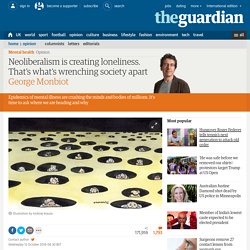
Yet plagues of anxiety, stress, depression, social phobia, eating disorders, self-harm and loneliness now strike people down all over the world. The latest, catastrophic figures for children’s mental health in England reflect a global crisis. There are plenty of secondary reasons for this distress, but it seems to me that the underlying cause is everywhere the same: human beings, the ultrasocial mammals, whose brains are wired to respond to other people, are being peeled apart. Economic and technological change play a major role, but so does ideology. Though our wellbeing is inextricably linked to the lives of others, everywhere we are told that we will prosper through competitive self-interest and extreme individualism. In Britain, men who have spent their entire lives in quadrangles – at school, at college, at the bar, in parliament – instruct us to stand on our own two feet.
3 Steps to Build Your Own Social Economy: The Secret to Weathering Any Economic Storm. Building Your Network: 3 Things to Do Everyday. How-to Build a Personal Ecosystem From Scratch. Olga Steidl is the Growth manager at Inbot.
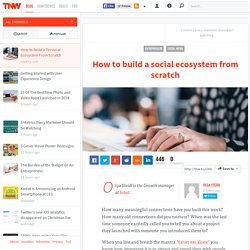
How many meaningful connections have you built this week? How many old connections did you nurture? When was the last time someone excitedly called you to tell you about a project they launched with someone you introduced them to? When you live and breath the mantra “never eat alone” you know how important it is to attract and spend time with people you like: the right type of people that help you naturally move forward mentally, emotionally and, of course, professionally. You need to start building connections and these connections can be looked at as your personal ecosystem. Over the last 10 years, I’ve worked within a variety of professional ecosystems in following areas: software, partnerships, personal and product PR, as well as local startup ecosystems in Berlin, Zurich, Vienna, Singapore, Moscow and St.
It is very crucial, in the modern world, to build these ecosystems. Understanding personal networks Steps to storytelling 1. 2. 3. 4. Networking Tips For Success. Everyone needs to network.
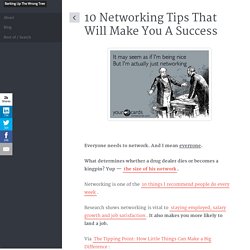
And I mean everyone. What determines whether a drug dealer dies or becomes a kingpin? Yup — the size of his network. Networking is one of the 10 things I recommend people do every week. Research shows networking is vital to staying employed, salary growth and job satisfaction. Via The Tipping Point: How Little Things Can Make a Big Difference: In his classic 1974 study Getting a Job, Granovetter…found that 56 percent of those he talked to found their job through a personal connection.
It makes you more likely to be successful at your job. Via The Happiness Advantage: The Seven Principles of Positive Psychology That Fuel Success and Performance at Work: Secrets Of Excellent Conversationalists. The solution to the age-old problem of understanding others may be as simple as taking the time to improve your active listening skills.
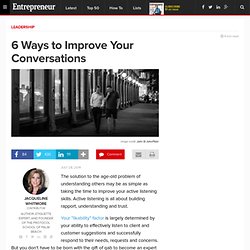
Active listening is all about building rapport, understanding and trust. Your “likability” factor is largely determined by your ability to effectively listen to client and customer suggestions and successfully respond to their needs, requests and concerns. But you don’t have to be born with the gift of gab to become an expert communicator. Here are six tips to help you become a better listener and actually hear what others are saying, not just what you think they are saying or what you want to hear. Related: 5 Ways to Be a Better Listener 1. 2. Trust and Social Collateral. The Social Structure of Trust. Robert Putnam - Social Capital - Manchester [1/5] The Decline of Social Capital. Better Together, an initiative of the Saguaro Seminar: Civic Engagement in America, Kennedy School of Government. What does “social capital” mean?
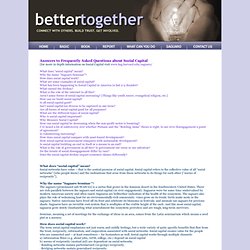
Social networks have value – that is the central premise of social capital. Social capital refers to the collective value of all “social networks” [who people know] and the inclinations that arise from these networks to do things for each other [“norms of reciprocity”]. Why the name "Saguaro Seminar "? The saguaro [pronounced sah-WAH-ro] is a cactus that grows in the Sonoran desert in the Southwestern United States. Social Capital - What is Social Capital. Social capital refers to the institutions, relationships, and norms that shape the quality and quantity of a society's social interactions.
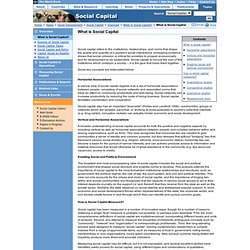
Increasing evidence shows that social cohesion is critical for societies to prosper economically and for development to be sustainable. Social capital is not just the sum of the institutions which underpin a society – it is the glue that holds them together. Some key concepts are elaborated below: Rachel Botsman: The currency of the new economy is trust. ThankUbank - World's first social capital bank. What Will Get You Hired Isn't on Your Resume. It’s the holiday season, and millions of people are about to get a flood of unsolicited career advice from older relatives.
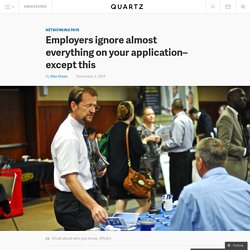
Most of it will be useless. You don’t need to be told that a resume should be clear, uncluttered, and typo free. (A good summary of common, deal-breaking mistakes comes from Google HR head Laszlo Bock.) But don’t obsess over format and wording, which have rapidly diminishing returns. How 5-Minute Phone Calls Could Make You Rich.